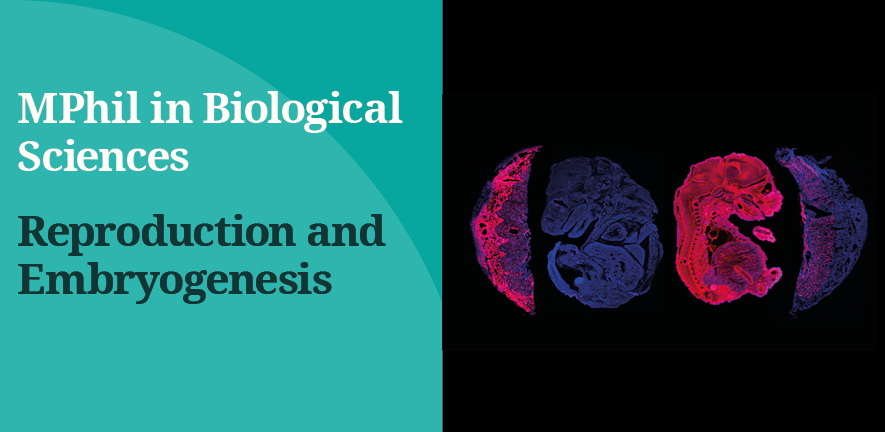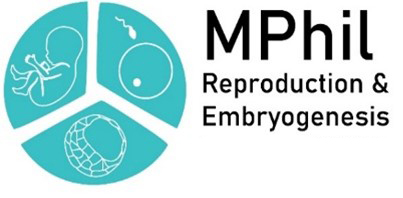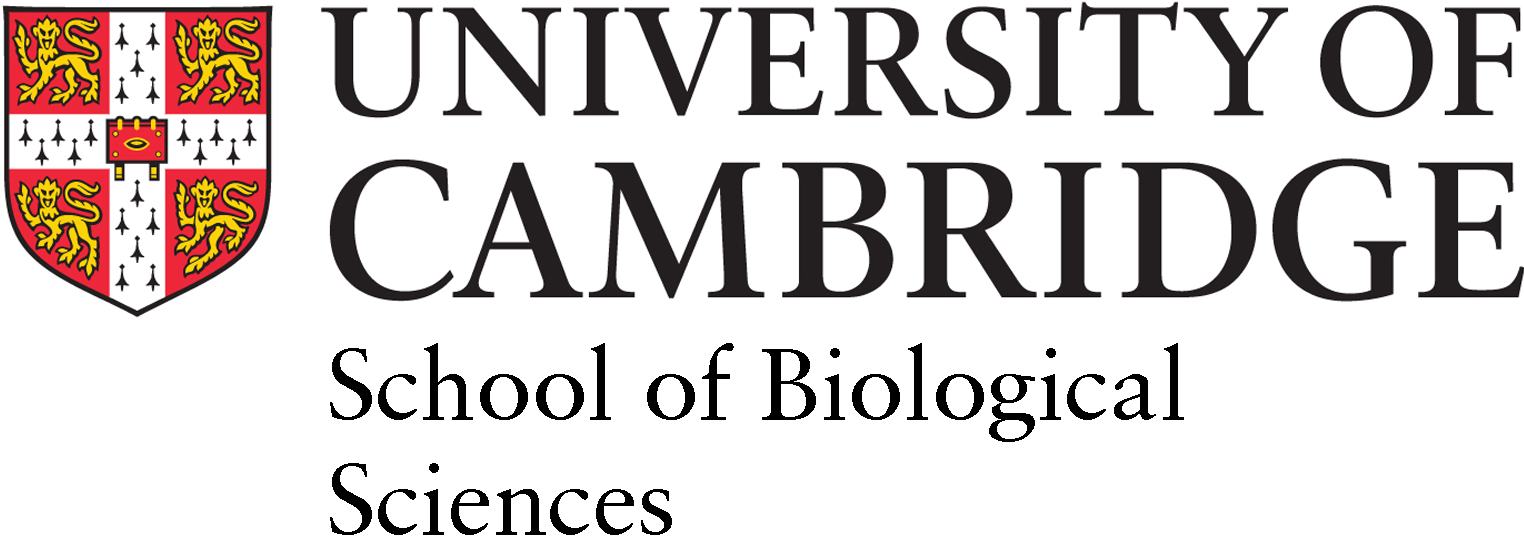
The MPhil in Biological Sciences provides students with an opportunity to undertake a period of study and research in Reproduction and Embryogenesis, one of the Faculty’s key research pathways.
Reproduction has broad relevance because of the way it impacts individuals, families, and populations, and because it raises discussions that span in scope from intimate experiences through to global health policies. Why do so many couples struggle with achieving a healthy pregnancy and why do babies and women still die globally during pregnancy and childbirth? How can we prevent these tragedies from happening? How can we use new discoveries about epigenetics and the developmental origins of diseases to ensure the best health outcomes for future generations? How will novel technologies and changes in the legal frameworks make parenthood more accessible to those who have traditionally been excluded? Is it possible to use germline genome editing – which has the potential to prevent babies from inheriting life-limiting diseases – in a safe and ethical manner? What can we learn about the future of reproduction by studying its history?
Finding answers to major questions like these requires informed input from diverse disciplines. This MPhil aims to provide comprehensive training in gametogenesis, reproduction, embryogenesis and feto-placental physiology through interdisciplinary taught modules and conducting innovative research projects with the leaders in the field. The course takes a multidisciplinary approach to reproduction through various complementary perspectives and disciplines, including historical, legal, and sociological aspects along with molecular and clinical sciences.
The course will draw upon the breadth and international strengths in reproduction and embryogenesis within the University of Cambridge and associated research institutes; notably the Departments of Biochemistry, Genetics, Pathology, Pharmacology, Physiology Development and Neuroscience, Sociology, Zoology, the Gurdon Institute, the MRC Toxicology Unit and the Wellcome-MRC Stem Cell Institute. Students will have the opportunity to join Cambridge Reproduction, an interdisciplinary initiative that brings together researchers with an interest in reproduction, broadly construed.
Teaching and course content
The taught component of the Masters in Reproduction and Embryogenesis will feature four core taught modules that will cover:
- Gametes and embryogenesis
- Extraembryonic tissues and maternal interfaces
- Fetal development, environmental factors and pregnancy outcome
- Stem cell-derived embryo models
These four taught modules will be complemented with core skills workshops and journal clubs with a focus on cutting-edge techniques, data interpretation, scientific writing, project presentation and critical analysis. Students will also have the opportunity to gain training in statistics and bioinformatics.
Students will also carry out a 32-week research project where (depending on the project) skills in molecular biology, genetics, epigenetics, genomics, cell culture, stem cell-based embryo models (gastruloids, organoids, blastoids), genome editing, biochemistry, metabolomics, bioinformatics and computer modelling will be acquired. Projects in a wide range of mammalian species and approaches will be available to students.
Key dates for applicants
Deadline for fee waiver: 20 December 2024
Deadline for funding: 7 January 2025
Deadline for applications: 30 April 2025
Course funding
The Alexander Crummell Fully Funded MPhil Scholarships provide a stipend of £17,668 in 2023 and University Fees at the home rate. The awards are open to students with black or black-mixed ethnicity, applying for an MPhil degree in a science-based subject at the University of Cambridge. The terms of the award include that you will become a member of Queens’ College, Cambridge. Deadline for applications: 7 January 2025
The Mastercard Foundation Scholars Program at Cambridge is designed to provide talented students from economically marginalised and hard-to-reach communities in Africa with fully-funded opportunities to complete their Master’s training, grow in transformative leadership, and contribute to climate resilience and sustainability in Africa. The Mastercard Foundation Scholars Program covers the cost of travel and visas, accommodation, meals, allowance for a laptop, health cover, and a living stipend – as well as tuition costs. It also provides an allowance for dependant children who may accompany a Scholar. Deadline for applications: 5 January 2025.
Prospective students who already have an offer of a place on this course may apply for a School of Biological Sciences Masters Bursary Award, which provides a top-up maintenance grant (c.£5,000) to support living expenses when a postgraduate Master’s loan or grant is taken with Student Finance England, Student Awards Agency Scotland, Student Finance Wales or Student Finance NI.
Other student funding opportunities at the University, including college or department scholarships, are advertised on the Postgraduate Funding Search website.
How to apply
If you are applying for admission in October 2025, you will need to pay an application fee of £50 before you can submit your application. The University of Cambridge is committed to widening access at postgraduate level and applicants may be eligible for an application fee waiver in certain circumstances. There is more information about this on the fee waiver page: https://www.postgraduate.study.cam.ac.uk/application-process/how-do-i-ap.... Please note: the deadline for applying for a fee waiver is 20 December 2024.
Applications for the course are made through the online Applicant Portal. There is information about which documents and information you will need for your application on the course website.
Further information
If you have any questions about the course, please email mphil@bio.cam.ac.uk.
There is more detailed information about entry requirements and course structure on the postgraduate admissions website.




